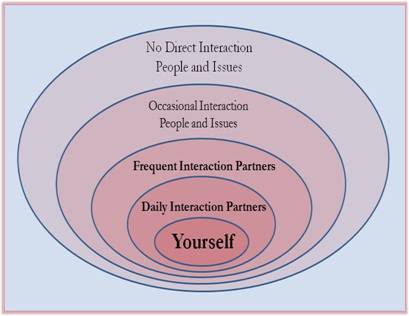What is your domain? And how can you master it?
Your domain is your circle of influence. And how you can master your domain is by managing the ways you interact with it. What do I mean by this?
It begins with this. In theory, the tools and strategies used to master your domain are really quite simple. Although some of these strategies may be new to you, many of them we all know and use all the time. And, because we are all people with similar motivating thoughts, there are times when we may choose not to use these strategies. Sometimes we feel justified in our choice to not engage or to not deescalate. Sometimes we are too distracted, stressed, angry, busy, tired, hurt or offended. Sometimes there are other reasons also.
The truth is that mastering your domain is not easy. Why is it not easy? It is not easy because we are dynamic people living in a dynamic world. The idea that great results can come with little effort is almost always misleading. Someone saying that having great beneficial influence on your domain can come with little effort tells you one of two things must be true. Either that someone is misinformed, or they are not sharing everything they know. Becoming master of your domain is challenging. If it was easy more people would be doing it, and clearly that is not the case.
So what makes the seemingly simple choice of operating in our own best interest so complicated?
One of the big reasons is our motivating thoughts. We are all people first, whether at work, at home, or anywhere else. We all bring a lifetime of personal experiences to every situation we encounter. That is why a great key to mastery is authenticity. This is not about rules, or someone else’s benefit. The need, or the choice, to use “master of your domain” tools and strategies is always internal, it’s for you. It is in your best interest. Of course that best interest could be as a leader, a person in authority, an influencer, or for your own personal reasons. Whatever the motivation, for mastery of your domain to be successful, others in your domain are involved. And these others will sense if your reasons are authentic. If they sense you are simply trying to strategize your way to your goal they will not be able to fully support you, even if they want to. That is an essential part of the human condition.
People naturally care about people who care about them. While there are many ways to motivate yourself and others, if you want real and lasting results you must have the sincere support of others. And to have the sincere support of others you must have an authentic motivation combined with the tools to consistently express your good intentions.
The attached diagram illustrates what your domain looks like. Your domain is not about things, it is about the people you interact with and what you focus on. Each of us interacts with ourselves, all day every day. Then we interact with daily partners, perhaps at work or at home. Then we have frequent interaction partners, perhaps at work, in neighborhoods, with friends, with extended family, with others. Then there are people and issues that we have only occasional interaction with or no direct interaction with at all. The point is all of these interactions contribute to our reactions to others. More to the point, our reactions to others, combined with their current domain influences, is what causes them to react to us. Then, of course, their reaction to us is what we react to. Not to mention that there are times when the reactions of others are not even expressed, rather, they are recorded as a festering “deal with it later” moment.
And that, my friends, is why the quite simple tools and strategies to become master of your domain are challenging to apply to the real world in real time. It is also why learning how hot buttons work, and how to manage them, is such a critical need. It is also why a facilitated, iterative approach is so valuable. It is literally the difference between learning some great theories and understanding how to apply those theories to your real world interactions in real time.
If you enjoyed this blog please link to our social media pages, hit the like button and follow us for more interesting and insightful looks into what it takes to build a results oriented communication culture.


